If you’ve ever seen Over the Garden Wall, chances are you’ve seen it more than once—it’s a show that rewards repeat viewings. If you’re not familiar with it, it’s a bit hard to explain—it’s an Emmy award-winning animated miniseries that first aired on the Cartoon Network in November, 2014. It’s weird, and beautiful, and not like anything else you’ve ever seen, and features the voice talents of Elijah Wood and Christopher Lloyd, along with John Cleese, Tim Curry, singer Chris Isaak, and opera singer Samuel Ramey, among others. I recently rewatched it, as I tend to do every November. Here’s why.
Everyone in my family dies in November.
It’s not an exaggeration. Every major death in my family, save one or two, happens between pumpkins and presents. The biting days of November are when my family says good-bye. Grandparents, aunts, uncles, and more have waved so long under skies well on their way to welcoming winter, morphing a time of gratitude and thanks into something more than a little bitter.
If October is when we notice the harbingers of death, and December is the cold quiet that comes after, November for me has always been the sound of gates opening to a land we’ll never truly comprehend.
But that’s not necessarily a bad thing. What’s so wrong with underworlds, anyway? Death is terrifying, sure. But so are plenty of things in life. And as so often happens in stories about death, about underworlds, about the passage from beating hearts to the journey beyond, that juxtaposition is where the lesson lies. And so we come to Over the Garden Wall. (Spoilers ahead.)
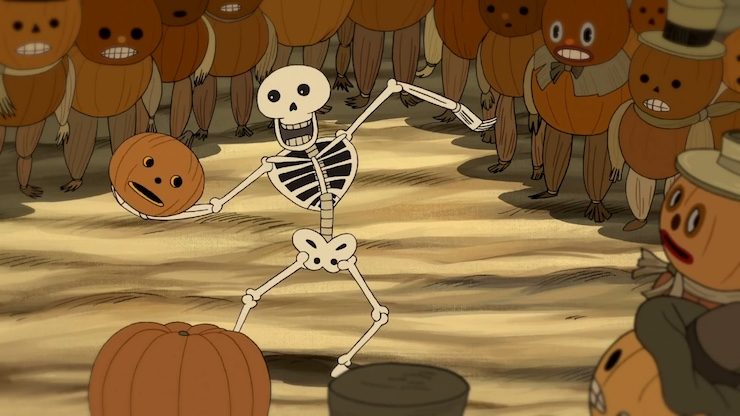
Created by Patrick McHale, a writer and animator who cut his teeth on Adventure Time, Over The Garden Wall tells the tale of Wirt, his little brother Greg, a pet frog (given various names including Kitty, Wirt Jr., and George Washington), a talking bluebird named Beatrice, and a host of other memorable characters as the boys try repeatedly to find their way home, separated from the reality they knew, lost and venturing through a strange, but beautiful landscape called “The Unknown.”
The Unknown is at turns gothic and autumnal, grim and threatening or comforting and even silly, with seasons of harvest and hearth giving way to snow and silence. It is populated with cute animals learning to read and write, a giant fish trying to (ironically) fish, a town of skeletons wearing pumpkin costumes to greet the harvest, an inn filled with singing, self-aware archetypes, a riverboat teeming with genteel frogs and toads, strange millionaires wandering through massive mansions, and a weary, broken old Woodsman, trying to chop down enough trees to keep his lantern lit. It is also home to The Beast, a shadow in the shape of a man crowned with enormous antlers, whose operatic dirge wends its way through the Edelwood groves, seducing travelers into his dark embrace. Over the Garden Wall threads that incredibly fine needle of being whimsical and light without ever becoming saccharine, while investing its dark premise with real stakes, real emotions, and a seriousness that at times cuts through the sweet like a sword through silence.
Into this mad world plop Wirt and Greg. Wirt (voiced by Elijah Wood) is in high school, and in his blue cape and red cap, strikes a unique image that just screams for attention when it’s the absolute last thing he’d ever want (Wirt is nothing if not supremely, painfully self-conscious). Greg is his younger half-brother and what he lacks in common sense, he more than makes up for in doing whatever he wants. Wirt is the worrywart, while Greg is a little kid trying his best to help his brother be happy, and not always realizing the danger they could be in. From his first step into the Unknown, Wirt is given to monologues of melancholy, often getting sidetracked on his mission to get home by wallowing in his own despair. Greg, meanwhile, accidentally feeds an evil turtle to a dog, transforming it into a mad wolf that attacks them (if you want to get a sense of what each brother is like, that pretty much captures their dynamic).
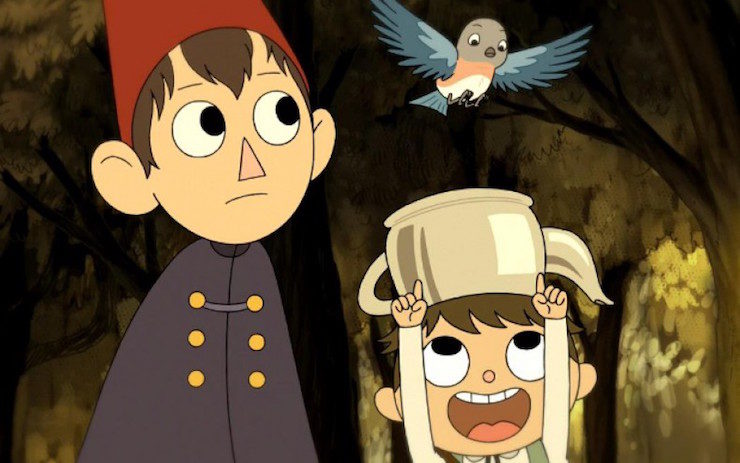
Stumbling from one bizarre situation to the next, they befriend Beatrice, a rather snarky bluebird who we find out used to be a human girl, as she does her best to seize the reins of this disastrous adventure and deliver the boys to Adelaide, the “good” witch of the woods. All the while, the Woodsman is out there in the dark forest, striving to keep his lantern lit amid a dwindling supply of fuel, taunted cruelly by The Beast. The adventures of Wirt, Greg, and Beatrice into the Unknown are a mixture of fable, legend, fairy tale, and more, as they cross paths with dozens of stories already in progress—some intersecting meaningfully with their own, others merely passing by on their own parallel, enigmatic course. All of this, along with a flourish of song, unique style, and aesthetic of a remarkably vintage design (with sources in everything from classic children’s book illustrations and early animation to magic lantern shows), make Over the Garden Wall a fascinating, overdetermined jumble of symbols and storytelling logic with a magic all its own.
While we’re initially left in the dark as to why the boys have ended up here, Wirt’s attitude of contempt and blame toward Greg speaks volumes, and Wirt’s strained relationship with his half-brother tells us a lot in a very little amount of time. Filled with a sense of self-loathing, awkward pride, embarrassment, and a desperation to fit in, Wirt cannot help but take himself and his world with utmost seriousness, unwilling to bend—or rather unbend—himself out of shape. Greg, meanwhile, can’t see why Wirt twists himself into these knots, and tries to do for Wirt what Wirt won’t, or can’t, do for himself. Greg tries to take out the Woodsman, tries to smuggle George Washington the frog, tries to help many of the odd characters they encounter along the way, tries to sacrifice himself to the Beast in Wirt’s place, and most of all, tries to give Sara (the object of Wirt’s desperate crush) the mixtape of music and poetry that Wirt made for her. Greg’s heart is always in the right place, even if he can’t suss out the minor details and subtleties of a moment. As she accompanies the brothers through The Unknown, Beatrice grows more and more sympathetic toward Wirt and Greg, moving from a place of self-centered actions to the point of actually caring about the boys, even foregoing her own happy ending (albeit after an initial betrayal), to make sure her friends don’t get sacrificed to The Beast.
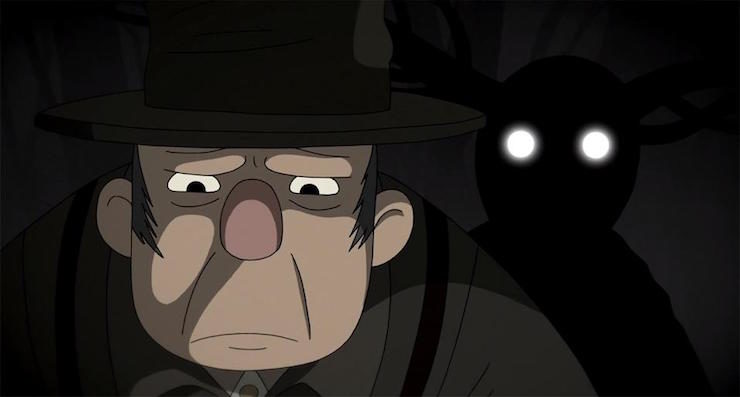
Over The Gareden Wall contains many journeys in its ten short episodes, but there is an undeniable push toward maturation and hard-won understanding that underlies the whole of this trip to the Underworld. Wirt learns to stop keeping Greg at arm’s length, embracing his brother and realizing that he must help him, no matter what. More than that, he has to stop blaming Greg for everything and take responsibility for his own actions. It’s ironically Wirt’s healthy dose of teenage skepticism and cynicism that cuts through the final offer of The Beast, as he holds Greg in his grim clutches. Beatrice recognizes that she can’t allow others to be hurt in her own quest to save herself and her family, and she works to overcome that terrible moment. The Woodsman, through the help of Wirt’s keen observations, realizes that he has been letting The Beast dictate his life over a lie, that he has let the terrible song in the woods keep him miserable and unhappy, whilst allowing The Beast to feeds off that misery in an endless cycle—it is a terrible moment of acceptance when that unhappy lantern is snuffed. Even Greg learns to be better, as we see him replace his painted rock friend back in the yard from which Greg stole him in the first place.
This journey into the Unknown, we find out, was caused by the boys running from the cops in a graveyard on Halloween night, tumbling over a wall in a garden cemetery, and falling down a hill into the river that lay beyond. As they leave the Unknown, the world fades to darkness, and they come to in the back of ambulance, sopping wet. They’d almost drowned, it seems. Was it all a dream? A shared hallucination? It can’t be: a mystical bell still sits in the belly of Wirt’s frog. Wirt and Greg really went beyond, somehow, over the garden wall and into someplace unknown.
But it’s not the Unknown, not anymore. It’s no longer a strange land we cannot comprehend, but rather an oddly familiar place, perhaps one we haven’t been to in some time. There are people there like you and me. Sometimes they’re bluebirds, and sometimes they’re skeletons that dance as the leaves turn, and sometimes they’re sharing songs and stories in an inn, and sometimes they’re fish trying to fish. Sometimes, they’re families trying to come together. And sometimes they’re lost, lonely, terrified people who need help shouting down the darkness that’s blinding them. Sometimes, they’re you and me.
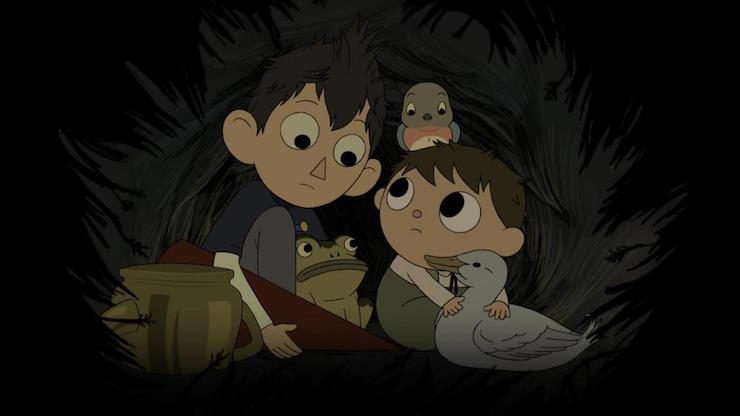
By the story’s end, we understand the Unknown for what it is. It may be Unknown at the start, but really, it’s just another step, another world, another leg of the journey. It may even continue on after that. All that matters is that we learn to love one another while we have each other on this side of the garden wall.
The matter of what lies beyond it? We’ll cross over when we need to, and not a moment before.
(And that’s a Rock Fact.)
Martin Cahill is a contributor to Tor.com, as well as Book Riot and Strange Horizons. He has fiction forthcoming at Beneath Ceaseless Skies and Fireside Fiction. You can follow his musings on Twitter @McflyCahill90.










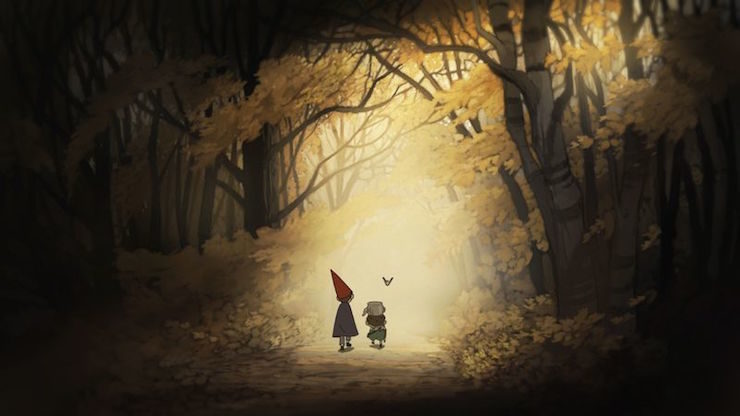
The show reminds me of Ray Bradbury’s The October Country. I think it’s his finest short story collection, and it contains the same atmosphere of passing through haunting stories that Over the Garden Wall has.
…also reminds me of the old cartoon, Simon in the Land of Chalk Drawings; the pictures he drew took him “over the garden wall” into that Land, where any and everything could happen, based on how the Land interacted with the drawing he drew that day. It, too, was an exploration of the Unknown through the eyes of a child.
This show is one of my favorite things, and I show it to every friend I get the chance to. Thank you for this review of it. I especially loved your explanation of the familiarities of the Unknown-that was wonderful.
Fun (rock) fact, I am currently writing this on my phone with a cover depicting Wirt, Greg, Beatrice, and Jason Funderburker the frog. And the beast hiding in the trees.
The first time I saw this, I was disappointed with the “all just a dream” ending, since I thought the small touch of the bell in the frog’s stomach was too subtle to be definitive – more of an easter egg than an indication that the Unknown is canonically real.
But the second time I realized there’s a less physical (and therefore more meaningful?) sign that Greg and Wirt really shared their journey: when Wirt wakes up, Greg is relaying a story that happened to them. So clearly they both remember the same events!
I just finished the series and I’m so torn there isn’t a second season yet!! This article is really helpful since I’ve had too many questions about it myself. Will there be another one soon? I hope they make more I love Greg’s character and I actually cried with what he did for his brother. I’ve really enjoyed the eholey series I really hope for a new season!!!
I think I dreamed of this.
I proved Creation is a scientific fact.
Crazy dream shortly before this was released.
It was a very mellow dramatic, monotone narrative of an adventure through a wood. With a kettle, and a stout goblinesque man.
Was fun. I remember it fondly, as the creapiest thing I love, for its comfort value.